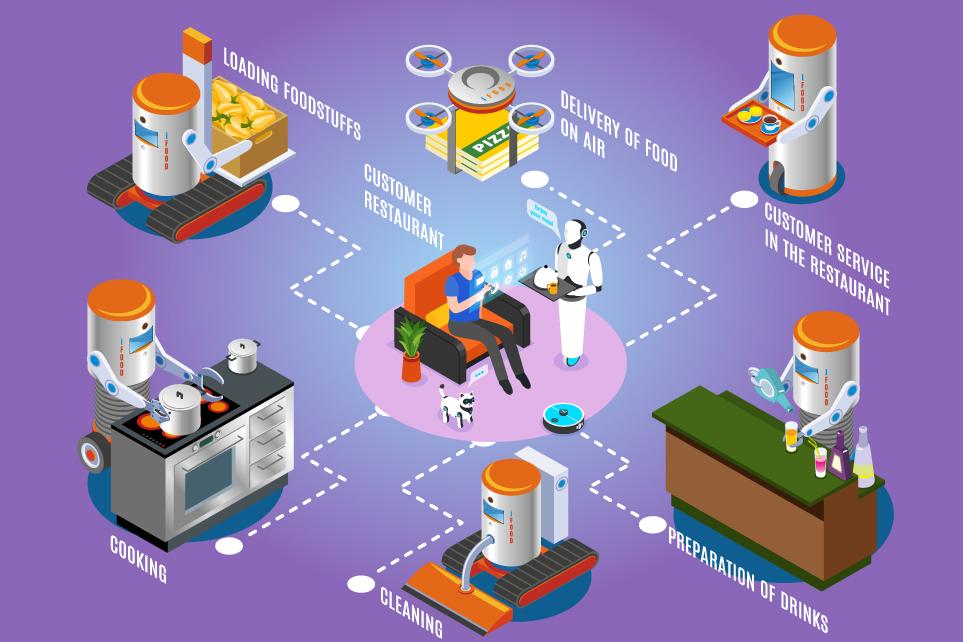The food and beverage industry is a complex ecosystem, with ingredients traversing continents and transforming into diverse products before reaching our plates. Managing this dynamic flow efficiently is crucial, and increasingly, food & beverage companies are turning to Artificial Intelligence (AI) as a game-changing ingredient in their supply chain strategies.
From Cloudy Forecasts to Crystal Ball Accuracy:
Demand forecasting is the lifeblood of any supply chain. Traditionally, this involved statistical models and educated guesses, often leading to overstocking or stockouts. AI consultancy, with its ability to analyze vast amounts of historical data, internal and external factors like weather and social trends, paints a much clearer picture. Companies like Kraft Heinz use AI to predict demand with 95% accuracy, leading to optimized production and reduced waste.
Inventory Optimization: From Feast to Famine, No More:
Inventory management is a delicate dance between meeting demand and minimizing holding costs. AI steps in with its predictive prowess, analyzing factors like product life cycles, lead times, and supplier reliability to suggest optimal inventory levels. This allows companies like PepsiCo to reduce inventory by 15%, freeing up capital for other investments.
Smart Logistics: Delivering Freshness, Fast:
Logistics play a vital role in ensuring timely deliveries and maintaining product integrity. AI-powered route optimization tools, like those used by Nestlé, consider factors like traffic patterns, weather conditions, and vehicle capacity to determine the most efficient routes. This translates to quicker deliveries, reduced fuel consumption, and fresher products reaching consumers.
Food Safety: Preventing Spoilage, Protecting Consumers:
Food safety is paramount, and AI is playing a critical role in safeguarding the food chain. AI-powered image recognition systems, employed by companies like Walmart, can scan incoming ingredients for potential contaminants with high accuracy. Additionally, generative AI companies use algorithms that can analyze historical data to predict spoilage risks and alert companies to take necessary actions.
Sustainable Sips: AI for a Greener Footprint:
Sustainability is gaining traction in the food and beverage industry, and AI is a valuable tool in this journey. AI helps optimize energy consumption in manufacturing plants, reduce waste through improved production planning, and even source ingredients from sustainable farms based on AI-driven data analysis. Danone, for example, uses AI to optimize water usage in its production plants, saving millions of liters annually.
The Human-AI Collaboration:
While AI is revolutionizing the food and beverage supply chain, it's important to remember it's not a silver bullet. Human expertise and judgment remain crucial in interpreting data, making strategic decisions, and ensuring ethical considerations are addressed. The future lies in a collaborative approach where AI empowers human decision-making, not replaces it. This collaboration resulted in a newest OpenAI API pricing calculator.
Challenges and Considerations:
Despite the potential, implementing AI in the food and beverage supply chain has its challenges. Data quality and accessibility remain critical hurdles. Additionally, ensuring responsible AI development and deployment, addressing potential biases, and navigating ethical considerations are crucial.
Looking Ahead: A Toast to the Future:
AI is rapidly transforming the food and beverage industry, offering numerous benefits for companies and consumers alike. By embracing AI responsibly and strategically, food and beverage companies can create more efficient, resilient, and sustainable supply chains, ultimately delivering fresher, safer, and more affordable products to our tables. So, raise a glass to the future of food, where AI is the secret ingredient for a more delicious and sustainable tomorrow!


